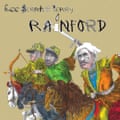For a while now, the annual Lee “Scratch” Perry album has seemed like a chore for everybody involved. The good bits usually came courtesy of Adrian Sherwood, the progressive dub reggae producer of four decades’ standing and a friend and collaborator of Perry’s for three of those. On Rainford, he brings a sense of control and confidence, providing the perfect environment for Perry to remind us why he was so special in the first place.

Sherwood’s sounds, samples and musical ideas inhabit the sharp end of today’s technology, but the techniques are straight out of the golden age of dub and templates cut by, among others, Perry himself. These soundscapes happily sit alongside old-school jungle and dubstep but still feel as comfy as an old pair of shoes, modernising Perry but not minimising his efficacy.
One of Sherwood’s big strengths is that he has always seen the whole spectrum of reggae sub-styles: here he varies what’s on offer, meaning that Perry’s tunes come across as sprightly as his trains of thought: Let It Rain’s string section; the restrained 21st-century roots Children of the Light; Makumba Rock’s dubstep stylings; African Starship, wreathed in Wareika Hills’ ganja smoke. Most importantly, Sherwood never forgets his duty of care to the audience – to make them groove, not just stand back in amazement at how bonkers the whole thing is.
What puts Rainford so far above recent outings is how disciplined it is. Sherwood isn’t scared, in classically democratic dub style, to make Perry’s vocals one more part of the mix, not the obvious star of the show. It allows for the expected stream-of-consciousness and apparently random subject-matter to holistically merge with the production, softening what can grate over an entire album. Most significantly, it means Perry’s well-trodden themes of vampirism, capitalism, Catholicism (“I kick the Pope in his arse”), judgment, retribution and his multiple identities all put in appearances, but in these circumstances forsake the same old disembodied ranting for dub-wise logic. This remarkable return to form has Lee Perry making sense, relatively speaking.

Comments (…)
Sign in or create your Guardian account to join the discussion